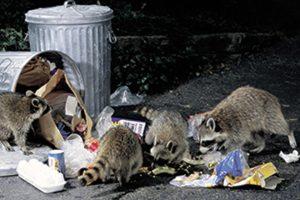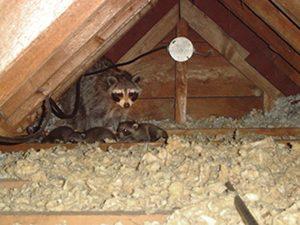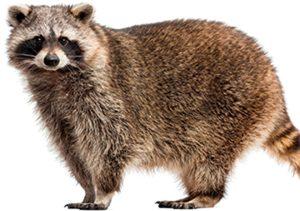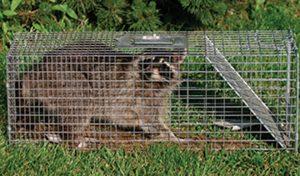 Florida is known for its expansive wildlife population. From squirrels to bears, there is no telling what animals might be found in Florida’s residential areas. With many species in proximity, there is an increased risk of critters from the outside world entering our homes. This can ultimately result in property damage, stolen food, or the spread of disease. One such creature Florida homeowners should always appreciate from afar is the raccoon.
Florida is known for its expansive wildlife population. From squirrels to bears, there is no telling what animals might be found in Florida’s residential areas. With many species in proximity, there is an increased risk of critters from the outside world entering our homes. This can ultimately result in property damage, stolen food, or the spread of disease. One such creature Florida homeowners should always appreciate from afar is the raccoon.
The raccoon (Procyon lotor) lives near moist woodland areas as well as urban areas and many neighborhoods. Raccoons have multiple den locations within a mile diameter, meaning they search for and store food in a variety of scattered locations. Chances are, if you reside in a house neighboring woods, you are vulnerable to the possibility of a hungry raccoon entering your property. These critters are omnivorous and enjoy many foods humans keep in their homes, such as vegetables, nuts, fish, etc. Perceiving raccoons as helpless and hungry, many people are susceptible to feeding these critters. However, once you feed them, they will no longer be afraid of you. Rather, raccoons will feel they have control over you and will be emboldened enough to act aggressively. Likewise, once one raccoon successfully gets food, this may lead to others of its kind seeking similar generosity from you. To avoid a swarm of hungry critters, it is best to let raccoons find their food exclusively in the wild. This opportunistic determination is what makes raccoons such effective scavengers to begin with. Additionally, raccoons will forage through garbage, so make sure to avoid leaving trash or remnants of food in your yard and other exposed areas. Considering raccoons are active in the late afternoon and at night, it is best to do an outdoor sweep of your home before bed to limit these nighttime visitors.
 With an abundance of raccoons living throughout Florida, it can be easy to overlook them as benign, commonplace creatures. While raccoons are harmless to us when outdoors, they can cause tremendous property damage if they get inside, including scratching walls and hardwood floors, ripping furniture, and breaking fragile items. These animals can also cause distress to pets. Remember, raccoons can grow to be 30 inches and weigh 15 pounds. Should your pet corner a raccoon, the raccoon will get defensive, potentially leaving bite marks and lacerations as well as an expensive visit to the veterinarian. A raccoon in the home is also cause for alarm because it is a source of contamination, as raccoons function as primary carriers of rabies, tuberculosis, and distemper. In fact, the rabies virus remains stable in many Florida raccoon populations. Not only do the critters themselves carry disease, but also their feces and urine contain salmonella and leptospirosis. Most dangerous is the raccoon roundworm found in their feces, which can cause serious health problems from mere inhalation. To preserve your belongings and keep loved ones safe, it is best to admire these critters from afar.
With an abundance of raccoons living throughout Florida, it can be easy to overlook them as benign, commonplace creatures. While raccoons are harmless to us when outdoors, they can cause tremendous property damage if they get inside, including scratching walls and hardwood floors, ripping furniture, and breaking fragile items. These animals can also cause distress to pets. Remember, raccoons can grow to be 30 inches and weigh 15 pounds. Should your pet corner a raccoon, the raccoon will get defensive, potentially leaving bite marks and lacerations as well as an expensive visit to the veterinarian. A raccoon in the home is also cause for alarm because it is a source of contamination, as raccoons function as primary carriers of rabies, tuberculosis, and distemper. In fact, the rabies virus remains stable in many Florida raccoon populations. Not only do the critters themselves carry disease, but also their feces and urine contain salmonella and leptospirosis. Most dangerous is the raccoon roundworm found in their feces, which can cause serious health problems from mere inhalation. To preserve your belongings and keep loved ones safe, it is best to admire these critters from afar.
While the presence of raccoons near your property poses many risks, these critters offer undeniable utility. For starters, raccoons clean up the rotting carcasses of dead animals. Likewise, raccoons remove littered trash off our sidewalks and streets. Raccoons also feast on populations of other pests like snakes and rats. Additionally, raccoons eat fruits and nuts, which ultimately helps spread plant seeds. Their unique maintenance of the natural world is just another reason humans should coexist with raccoons.
 A common problem with raccoons is their presence in an attic. While food will undoubtedly attract raccoons, some search for a dark place to sleep or merely a safe location to deliver a litter. The insulation in an attic makes this a favorable location for raccoons to deliver their young. Should you find one of these critters in your attic, there are a few tips to follow to ensure it is safely removed. First, it is important to find the point of entry; refrain from sealing this opening to avoid trapping the raccoon in. Next, you can either prompt it to leave with loud noises (such as banging pans) or lure it with a piece of food. Because raccoons are scavengers, they will eat just about anything. Despite being a burden, killing raccoons risks extinction, which is detrimental to local ecosystems. Accordingly, raccoons are protected by the Florida Fish and Wildlife Conservation Commission. Only those with a valid hunting license can hunt a nuisance raccoon. You are encouraged to call a local animal control service for assistance in trapping and relocating a nuisance raccoon. If necessary, you may use a trap with bait to humanely capture and properly release the raccoon yourself. Although steel traps are illegal without a permit, live traps and snares are legal in Florida. Some inexpensive bait choices are dry cat food, peanuts, and sweet corn. If after a few days the raccoon has not approached the bait, place some more around the trap and wire the trap door so it cannot close. When the raccoon is comfortable enough to regularly enter the trap to eat, unwire the trap door and wait for the critter to return. Florida residents may release a nuisance raccoon if both the capture and release sites are on a contiguous stretch of property. However, if the raccoon itself is native to Florida, the release location must meet two additional stipulations; it must span at least 40 contiguous acres and must be within the same county in which the raccoon was captured. If the release location is on privately-owned land, you should also acquire written permission from the property owner explicitly approving the release of a native raccoon on the land. Ultimately, returning raccoons to wilderness fosters our necessary coexistence.
A common problem with raccoons is their presence in an attic. While food will undoubtedly attract raccoons, some search for a dark place to sleep or merely a safe location to deliver a litter. The insulation in an attic makes this a favorable location for raccoons to deliver their young. Should you find one of these critters in your attic, there are a few tips to follow to ensure it is safely removed. First, it is important to find the point of entry; refrain from sealing this opening to avoid trapping the raccoon in. Next, you can either prompt it to leave with loud noises (such as banging pans) or lure it with a piece of food. Because raccoons are scavengers, they will eat just about anything. Despite being a burden, killing raccoons risks extinction, which is detrimental to local ecosystems. Accordingly, raccoons are protected by the Florida Fish and Wildlife Conservation Commission. Only those with a valid hunting license can hunt a nuisance raccoon. You are encouraged to call a local animal control service for assistance in trapping and relocating a nuisance raccoon. If necessary, you may use a trap with bait to humanely capture and properly release the raccoon yourself. Although steel traps are illegal without a permit, live traps and snares are legal in Florida. Some inexpensive bait choices are dry cat food, peanuts, and sweet corn. If after a few days the raccoon has not approached the bait, place some more around the trap and wire the trap door so it cannot close. When the raccoon is comfortable enough to regularly enter the trap to eat, unwire the trap door and wait for the critter to return. Florida residents may release a nuisance raccoon if both the capture and release sites are on a contiguous stretch of property. However, if the raccoon itself is native to Florida, the release location must meet two additional stipulations; it must span at least 40 contiguous acres and must be within the same county in which the raccoon was captured. If the release location is on privately-owned land, you should also acquire written permission from the property owner explicitly approving the release of a native raccoon on the land. Ultimately, returning raccoons to wilderness fosters our necessary coexistence.
 While appearing cute and harmless, raccoons on your property can cause a serious financial burden and safety concern. Should they enter the home, raccoons pose the threat of disease, property damage, and, of course, stolen food. The best policy to avoid these opportunistic creatures is abstaining from feeding them, routinely checking your house for possible entry points, and making sure no exposed trash or food remains outside your home. Nonetheless, raccoons are a necessary contributor to local ecosystems and a helpful eliminator of litter and animal carcasses. While their presence in nature ultimately benefits humans, raccoons on your property should be met with proper attention.
While appearing cute and harmless, raccoons on your property can cause a serious financial burden and safety concern. Should they enter the home, raccoons pose the threat of disease, property damage, and, of course, stolen food. The best policy to avoid these opportunistic creatures is abstaining from feeding them, routinely checking your house for possible entry points, and making sure no exposed trash or food remains outside your home. Nonetheless, raccoons are a necessary contributor to local ecosystems and a helpful eliminator of litter and animal carcasses. While their presence in nature ultimately benefits humans, raccoons on your property should be met with proper attention. ![]()
Stephen Levy
Home & Yard Magazine




